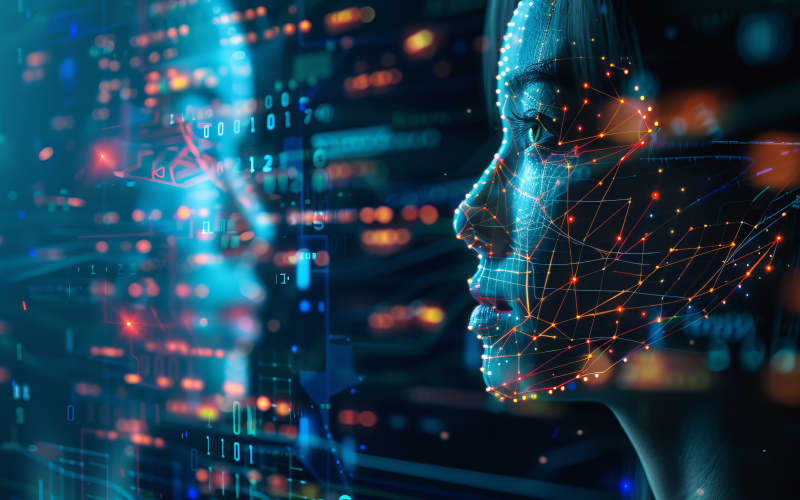As the media abounds in news about Artificial Intelligence, the topic permeates and is debated in most social and economic circles. This accelerated popularization also generates a series of myths about Artificial Intelligence, which can be found in various forms including in the Romanian entrepreneurial environment. Some people fear an “all-powerful” AI that will take over the world, while others believe that AI is nothing more than a buzzword. Similar myths exist about cloud computing, and the truth lies somewhere in the middle. We have made a selection of the most common preconceptions about Artificial Intelligence, and the short list looks like this:
1. Artificial Intelligence is a danger to humanity
After Elon Musk issued the warning last year that “AI is the biggest threat to humanity”, the opinion became widespread. For the first time in history, humans fear that they will be outsmarted by computers and that AI will lead to the extinction of human civilization. The fear also exists in Romania, and 59% of the participants in the Hotnews survey “Do you think AI is a danger?” answered YES, in while only 25% believe that field regulations will eliminate this risk. If Elon Musk is already suspected of commercial interests and the acute need for popularity, in the Romanian online environment the main cause is the lack of correct and coherent information, as well as the “bombshell” headlines in the mass media, such as the one in Libertatea “Robots equipped with artificial intelligence have declared that they can rule the world better than men.” Robots taking control of the planet is more like a science fiction movie script, and the article in Libertatea is just a script meant to attract the attention of journalists at a Global Summit. All analyzes show that the real risks associated with AI are the propagation of prejudices, discrimination, deepfakes and the use of technology for cybercrime purposes.
2. Artificial Intelligence has reached the same level of complexity as the human brain
Even though supercomputers hosting Artificial Intelligence benefit from billions of dollars of investment, current technology, including quantum computing, is still far from to match the complexity of the human brain. The human brain contains over 200 billion neurons, and each neuron connects with up to 10,000 other neurons through synapses. However, a synapse is not like an on-off switch and can contain up to 1,000 molecular switches. Add in the fact that there are about 100 neurotransmitters that regulate how neurons communicate, and the level of complexity is staggering. By one estimate, a human brain has more switches than the entire global Internet + Intranet. It is therefore not surprising that currently available technology cannot duplicate human thought.
3. AI and Machine Learning are similar technologies
In many online discussions and articles, Artificial Intelligence (AI) and Machine Learning (ML) are considered similar, especially when discussing big data, predictive analytics, cloud computing, and other digital transformation topics. Confusion is common because artificial intelligence and machine learning are closely related. However, these technologies differ substantially. Artificial intelligence is a broad field that refers to the use of technology in general to build machines and computers that have the ability to mimic the cognitive functions associated with human intelligence, such as the ability to see, understand and respond to spoken or written language , analyze data, make recommendations and more. Although artificial intelligence is often thought of as a system in itself, it is actually a set of technologies implemented in a system to make it capable of reasoning, learning, and acting to solve a complex problem. Machine Learning, on the other hand, is a subcategory of artificial intelligence and allows a system to learn and improve through experience. Instead of explicit programming, machine learning uses algorithms to analyze large amounts of data, learn from observations, and then make informed decisions. Machine learning algorithms improve their performance over time as they are trained – exposed to more data.
4. Artificial Intelligence will put people out of jobs
AI will obviously profoundly change the way we work and live, but every technological advance has had similar effects: James Watt’s steam engine (1769), Henry Ford’s assembly lines (1913), the advent of the PC (1974) etc. AI is no different from other technological advances and helps people and business processes become more efficient. Technology has always been a threat to jobs and throughout history, tellers, switchboards, typists have disappeared, and this process will continue in the future. AI and bots will simplify some activities and eliminate others, especially those that are repetitive, difficult to perform or risky. Human employees will handle activities of higher value or that require human interaction, empathy, emotion, creativity, etc..
5. Artificial Intelligence is an expensive technology accessible only to large companies
Sometimes there is a perception that Artificial Intelligence is a technology accessible only to large companies that can bear the high costs associated with its development and implementation. However, recent trends show that AI is becoming more accessible to small and medium-sized businesses as well, thanks to the increase in cloud-delivered AI solutions and services. AI has already entered the stage of democratization, including as a use in business. Virtual assistants, software robots, chatbots are just a few examples of AI-based technologies that are available in the cloud and the monthly cost is similar to a mobile phone subscription. An eloquent example is that AI and Machine Learning technologies are eligible expenses in programs like Digitization IMM dedicated to companies with 1 to 50 employees.
These are just a few myths about Artificial Intelligence, you’ve surely heard others. What we wanted to point out is that Artificial Intelligence is evolving rapidly and generating fundamental changes in society and the economy. It is natural for misunderstandings and fears to arise, but all these myths about Artificial Intelligence disappear at the slightest objective analysis.





